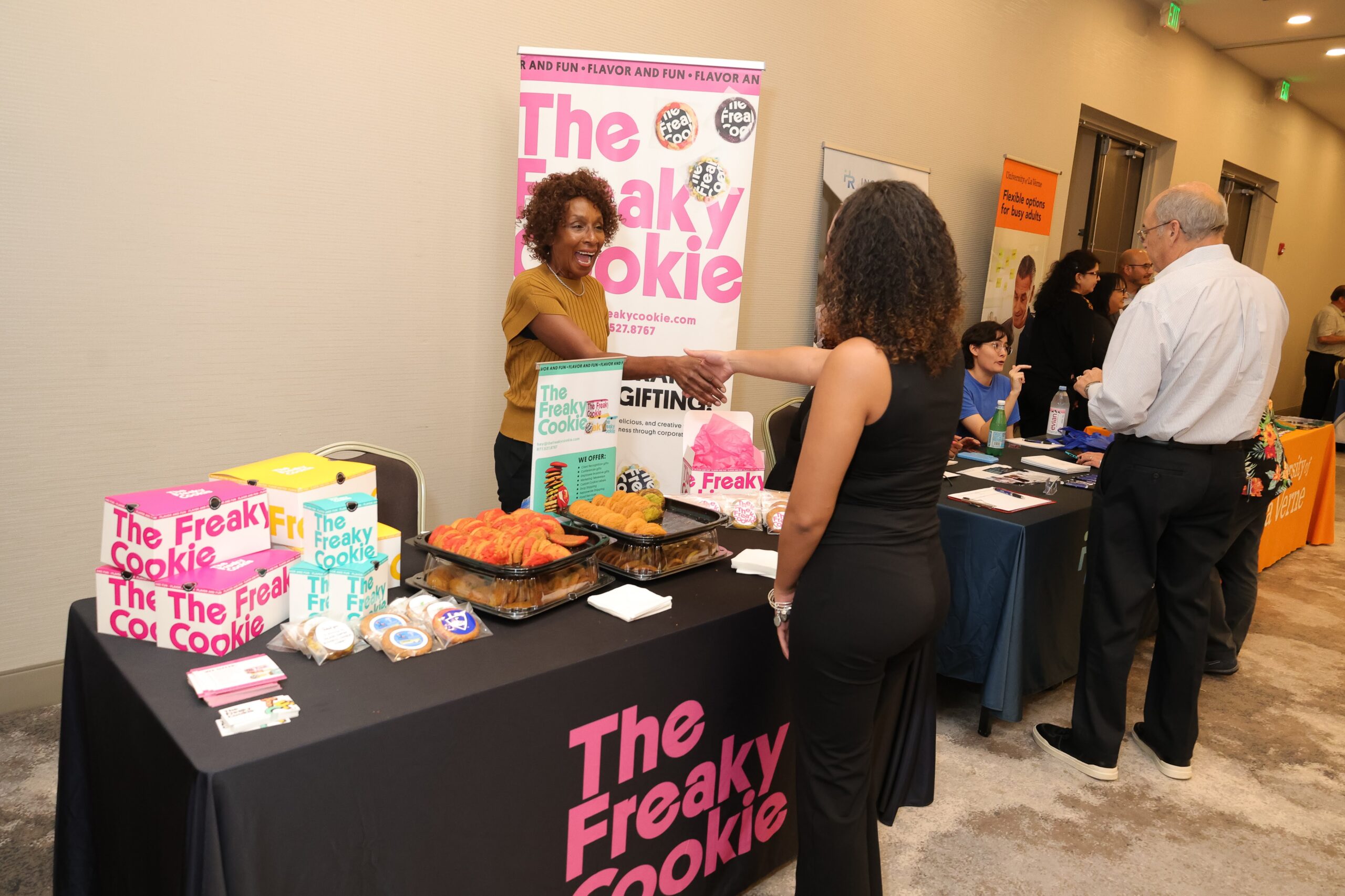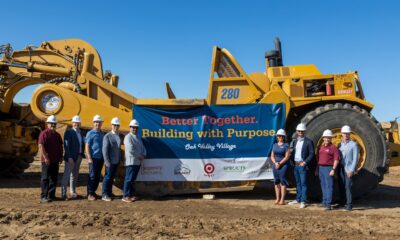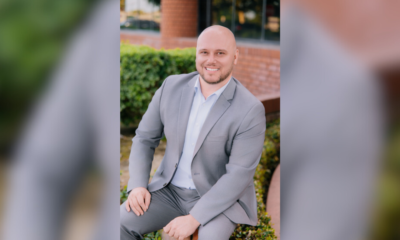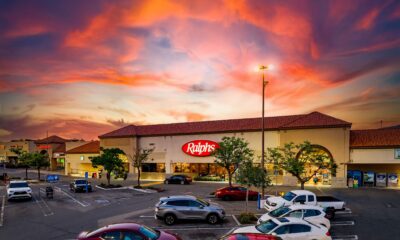Business
New Study Finds Prop. 15 will Not Harm Small Businesses In California

Research disproves misinformation that initiative would have negative impact on small businesses
By Anthony Matthews
A new report recently released found that Proposition 15, the Schools and Communities First ballot measure, would not impact the cost of small business rents for the roughly 80% of businesses renting their place of business or raise property taxes for the vast majority of commercial properties. The study was conducted by Beacon Economics LLC for Silicon Valley Community Foundation.
“Most claims about Proposition 15’s impacts on small businesses are unfounded. Our analysis shows that this initiative will not strain small business owners with skyrocketing rents and should actually affect small businesses very little,” said Christopher Thornberg, founding partner of Beacon Economics. “Entrepreneurs will want to remain part of California’s high-performing, innovation economy and, should it pass, this initiative won’t change that.”
The study found Prop. 15 will not impact small business renters, including triple net lease tenants. An analysis of nearly 12,000 properties in 12 counties found reassessment after a property sale does not increase business rents for retail properties, warehouse properties, and research and development properties. Office space tenants are an exception where this can fuel rent increases of 0.1% each year. In other words, the reassessment of a commercial property after 20 years could cause a one-time 2% rent increase for an office space tenant.
Other key findings of the report include the following.
- Prop. 15 won’t impact two-thirds of commercial properties. In a random sample of over 22,000 commercial property transactions in 12 counties during 2018-2020, 66% of commercial property sales were under $3 million and would be exempt from Prop 15.
- Of nearly 1 million businesses in California, 56% have fewer than 5 employees, 17% have 5-9 employees, and 12% have 10-19 employees.
- Prop. 15 would restore equity to property taxes since homeowners now pay 72% of property taxes relative to businesses. In 1978, it was 55%. In Los Angeles County, commercial properties paid 46% of property tax in 1978 but paid just 28% in 2017.
“Commercial rents are based on many market factors but property tax is not one of them. If it were, reassessments would trigger rent increases and there is no evidence of this,” said Taner Osman, research manager at Beacon Economics. “Small businesses typically require less space to operate so they tend to occupy relatively less expensive properties. This is why most small businesses purchasing their place of business will not be impacted by Prop. 15.”
“For the first time, we can separate fact from fiction about Prop. 15 impacts on small businesses,” said Walter Wilson, CEO of the SIlicon Valley Minority Business Consortium. “Armed with this new material, we can keep lies of impending doom in check and know that, whatever fate this initiative faces, there is no need to fear for the future of our small business community.”
“Small business owners are active members of their communities. They want the place they call home and build their business to do well,” said Tara Lynn Gray, President and CEO of the Fresno Metro Black Chamber of Commerce. “This report shows small business owners the choice about Prop. 15 does not pit the interests of their business and community against each other.”
“This report shows a single ballot initiative will not change how businesses negotiate leases. Like other businesses, landlords set rent prices based on supply and demand,” said John Ballon, owner of Two Enlighten in Glendale. “Right now, demand for office space is in decline. I recently renegotiated my lease for nearly a third less than what I was paying before the pandemic. My landlord said my moving out was not an option and she would ‘do what it takes to make it work.’”
“With the potential to unlock $12 billion to benefit local governments and schools, Proposition 15 is one of the most significant ballot measures facing California voters this November,” said Gina Dalma, executive vice president of community action, policy and strategy at Silicon Valley Community Foundation. “Together with Stupski Foundation and other generous supporters, Silicon Valley Community Foundation has invested in independent and objective research that produces clear, data-driven information to help inform voters about the potential impacts of Proposition 15. This study from Beacon Economics has indicated a clear finding that there is no significant relationship between reassessments and an increase in commercial rents, further invalidating misinformation that claims Proposition 15 would harm small businesses.”
Prop. 15 would require most commercial properties, except those valued under $3 million, to be taxed at fair market value through reassessment every three years. The revenue would be directed to K-12 public schools, community colleges, and local governments. Currently, property taxes on commercial properties are based on property values at the time of purchase with a cap on increases.
Business
Sweet Success: The Inland Empire Regional Chamber of Commerce Teams with The Freaky Cookie to Elevate Local WBENC-Certified Business

How The Freaky Cookie Grew with Chamber Support: A WBENC Success Story in the Inland Empire
At the Inland Empire Regional Chamber of Commerce (IERCC), we pride ourselves on championing business growth and recognizing the powerful stories of our members. One standout example is Sheila Cavalier, founder of The Freaky Cookie—a fun and rebellious cookie catering company she launched in 2018 alongside her son, Marcus.

What began as a direct-to-consumer venture has grown into a business-to-business powerhouse, fueled by innovation, strategy, and strong community ties. The Freaky Cookie specializes in custom-labeled, individually wrapped cookies for corporate gifts, bulk orders, and special events. Their nostalgic family recipe, dating back over 90 years, delivers both flavor and flair. As Cavalier puts it, “There’s never not a need for a large amount of cookies.”
Recognizing a unique market opportunity during the pandemic, Sheila pivoted the business model to focus on custom-branded cookies—meeting the surge in demand for individually packaged baked goods that also serve as creative marketing tools. “Corporations were tired of traditional marketing,” she recalls. “Our custom-labeled cookies became a fun, fresh alternative.”
In 2022, Sheila connected with IERCC President Edward Ornelas Jr. during the Multi-Chamber Mixer at Ontario International Airport. That meeting led to The Freaky Cookie joining IERCC, which soon opened doors to strategic partnerships and increased visibility. Through the chamber’s vast network and advocacy, Sheila has built relationships with organizations such as Bank of America, Fifth Third Bank, Top Golf, and Southwest Airlines, which featured The Freaky Cookie in their 50th Anniversary celebration at ONT.
“The IERCC has been a warm and welcoming space,” Cavalier said. “Having the chamber validate our business really means something. It’s helped us get our foot in the door with so many great companies.”
The impact has been tangible. With increased revenue and expanded operations, The Freaky Cookie is no longer just a clever name—it’s a growing force in regional commerce. As Sheila puts it, her goal now is simple but powerful: “Deliver smiles.”
Business
Fire Helmet Manufacturer Helps Disabled Community find Employment

Riverside’s Phenix Technology Leads with Inclusion, Empowering the Disabled Community Through Workforce Training and Employer Education
Written by Logan Rosselli, IEBJ Content Contributor
In the heart of Riverside, off of Chicago Avenue, a small, but mighty team has been quietly manufacturing life-saving equipment for firefighters across the world for over 50 years. Phenix Technology Inc. is an internationally recognized fire helmet manufacturer who builds their products from start to finish right here in the Inland Empire. For their great products, they’ve received numerous awards such as the Greater Riverside Chamber of Commerce’s 2025 Innovator of the Year, a 2016 “E” for Exports award from the U.S. Department of Commerce, a finalist position in the “Coolest Thing Made in California” competition and more. However, their most recent accolade doesn’t involve their products at all.
In 2024, Phenix founded the ground breaking “Opportunity for All” program to provide disabled community members with the opportunity to access career education, hands-on experience and employment opportunities through an 11 week training cohort. In this program, neurodivergent individuals wanting to find stable employment learn about standard hiring practices, writing a resume, effective interviewing and professional attire while getting on-the-job training with a partnered employer in the community. It has helped dozens of disabled community members to find a new sense of independence and achieve their full potential while helping local employers find dependable employees who bring a unique perspective to the workplace.
It’s for this program that the National Association of Workforce Development Boards (NAWB), a representative of over 570 workforce development boards across the United States, honored Phenix with the prestigious W.O. Lawton Business Leadership Award in late March.
“While we take tremendous pride in the products we make, we also believe we have a mission to create a better world through developing opportunities,” said Angel Sanchez, CEO of Phenix Technology in a statement released in early April. “Opportunity for All has helped prove that individuals who have historically been excluded from the workforce don’t just contribute — they elevate organizations. We are honored to receive this national award and grateful to the partners who have helped us make this vision a reality.”

CEO Angel Sanchez Jr. accepts the NAWB Award
Though “Opportunity for All” is certainly the cornerstone program for the company, Phenix’s leadership team was not satisfied to leave their mission there. Thus, in 2024, the company founded its nonprofit arm, Phenix Gateway to offer more programs and advocacy to the community. Through Phenix Gateway, the company offers workforce development workshops for individuals who don’t need the full scale of the “Opportunity for All” program, but want to improve a specific skill like resume writing or workplace social skills.
However, Phenix knows that preparing disabled people for the workforce is only one end of the equation; the workforce also has to be prepared to accept the unique skills, perspectives and challenges of the disabled community. For this reason, Phenix Gateway offers employer training workshops as well as educational materials available to businesses and the community. Training programs cover a lot of ground, ranging from assistance with optimizing interviews for people with neurodevelopmental disorders to creating sensory-friendly environments in the workplace.
In Riverside, these programs have had a huge impact on the local community. As of March 2025, Phenix’s Opportunity for All program has had over two dozen participants and 44% found stable employment through or after the program. Their one-off workforce development workshops have seen over 200 participants learn new skills and help them find employment and the nonprofit currently partners with close to 90 businesses to assist them in their endeavor to create a more inclusive workforce.

Phenix Gateway staff helps a program participant with his skills
For businesses or community members interested in learning how they can support or participate in these programs, Phenix encourages them to reach out by email to info@phenixgateway.org and to attend their First Annual Gala: Rising Together, A Phenix Gateway Celebration, on Thursday, May 15th. Tickets for this event are available at phenixgateway.org.
Business
Supported by Local Leaders, CALED’s Annual Conference will be in Ontario this May

Empowering Economic Growth: CALED Conference Set to Unite Industry Leaders in Ontario
CALED’s ‘Growing Local Economies from the Ground Up’ Conference is being held in Ontario at the DoubleTree by Hilton Hotel Ontario Airport on May 7-9. This event is co-hosted by the City of Ontario and San Bernardino County, with Jennifer McLain Hiramoto, CALED’s Chair of the Board and Derek Armstrong respectively representing their city and county as Co-Chairs of the event.
With over 950 members and 45 years of empowering economic developers, CALED is the largest economic development association in the country and the annual conference is the number one place to meet and connect with the boots-on-the -ground, decision makers in our communities.
The conference will include a pre-conference teaching tour, ‘Building & Paying for Development Projects’ on May 6th and then begin in full on May 7th, with a welcome session and breakouts. Overall, there will be four general assembly sessions and 18 breakout sessions, which will delve into local economic development practices and innovative tools.
In addition to compelling content, the conference will have numerous opportunities to connect with community leaders and valued peers through networking receptions, the culinary crawl, and new this year, the Tournament of Champions, where conference attendees will navigate a gauntlet of games to win the grand prize on the evening of Thursday, May 8th.
To learn more about the conference and register, visit the CALED website at www.caled.org.
-

 Technology4 months ago
Technology4 months agoLA Tech Week Highlights Southern California’s Expanding Tech Ecosystem
-

 Bizz Buzz3 months ago
Bizz Buzz3 months agoRegency Centers Unveils Oak Valley Village: A New Retail Hub Coming to Beaumont, CA
-

 Entertainment3 months ago
Entertainment3 months agoROI: Return on Insanity—Lucha VaVoom’s High-Yield Investment in the Pomona Arts Colony
-

 Food & Lifestyle4 months ago
Food & Lifestyle4 months agoFogo de Chão Heats Up Rancho Cucamonga Dining Scene
-

 Transportation3 months ago
Transportation3 months agoRegional Leaders Launch “Coalition for Our Future” to Advance Urgent Safety Solutions for I-15 Corridor
-

 Travel & Tourism3 months ago
Travel & Tourism3 months agoFly Ontario, Calif., to Honolulu aboard Southwest Airlines starting in June











